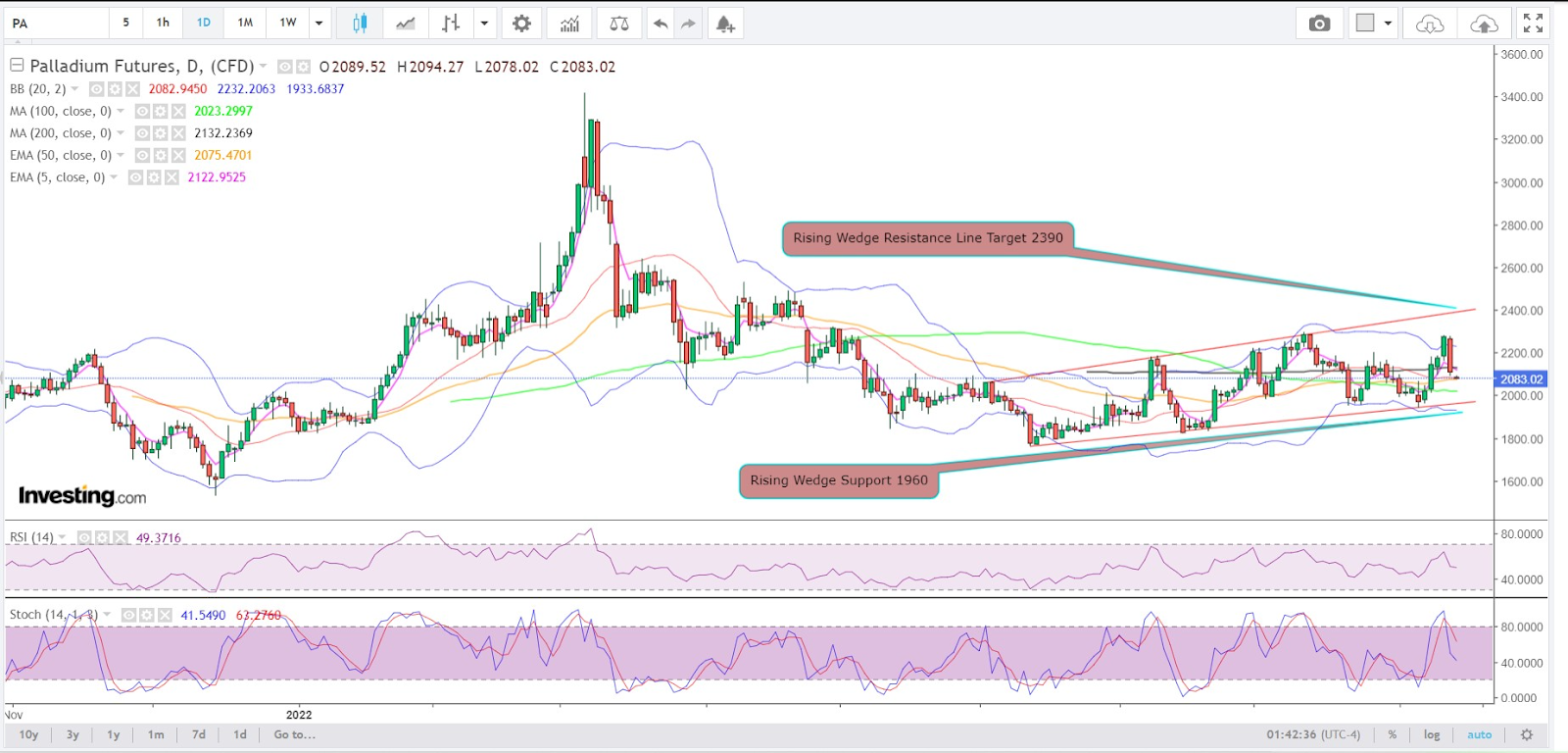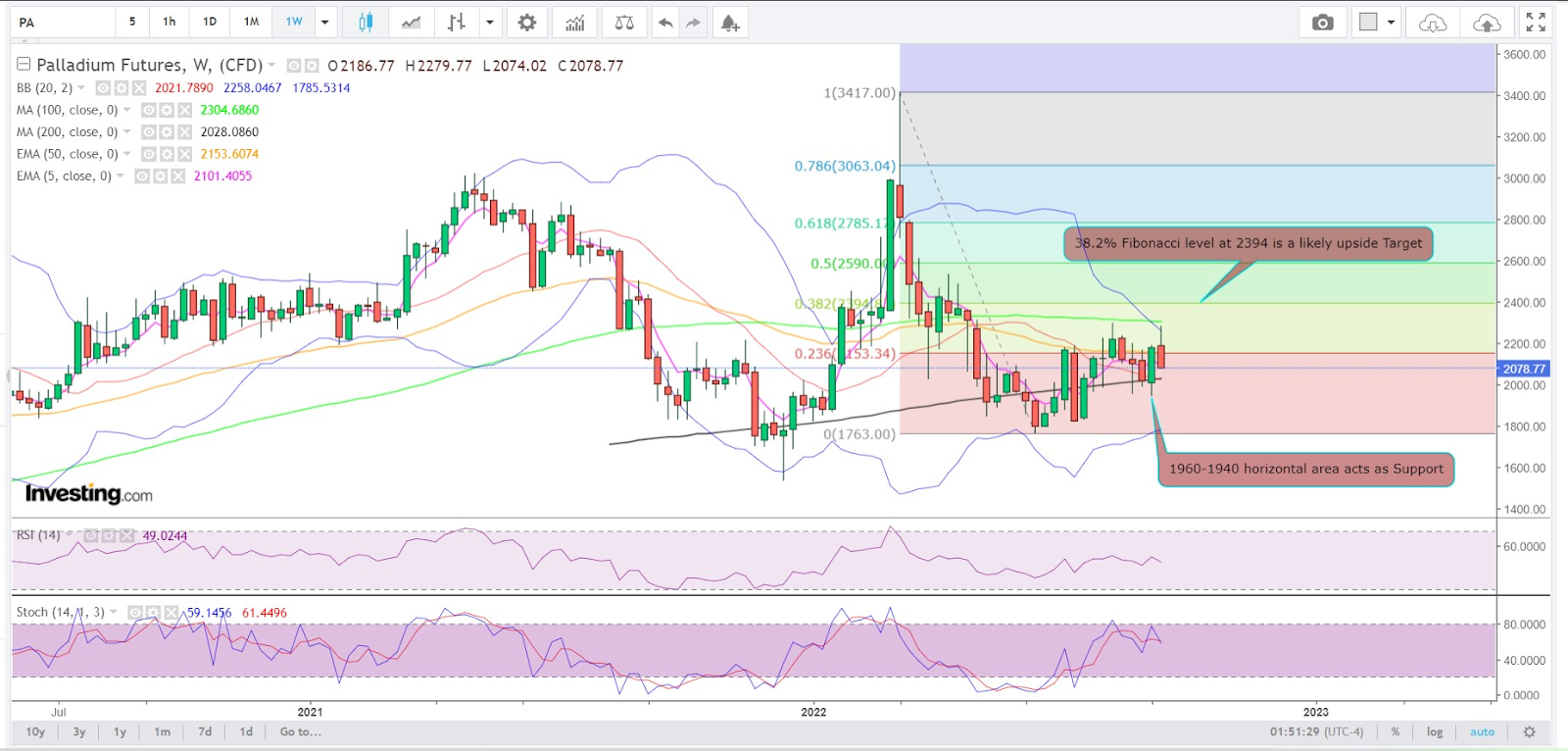- Palladium may be boxed in, going nowhere on economic uncertainty
- Hawkish Fed not making outlook any better for auto catalyst
- With appropriate demand, charts show palladium could target $2,394
After its strongest rally in six months in July, palladium's run-up ended even before the start of August. Four of the past five weeks have been in the red. While this week could have made a positive difference, the latest read on US inflation seems to have sealed the fate of the autocatalyst metal.
Palladium futures on the New York Mercantile Exchange’s COMEX division hovered at just under $2,090 an ounce at the start of Wednesday’s Asian trading. That was almost $200 below the $2,280 high seen on Monday.
Prior to that, palladium made a spirited leap of $300 over four days of trading.
All that upside came to a nothing after Tuesday’s release of the Labor Department’s Consumer Price Index report for August, which showed an annualized growth of 8.3% for August, above the 8.1% forecast by economists.

Charts by SKCharting.com, with data powered by Investing.com
While the August CPI reading was certainly an improvement over June’s annualized growth of 9.1% and July’s year-on-year (yoy) expansion of 8.5%, it didn’t score well with a Federal Reserve looking for a higher degree of comfort that prices were coming significantly off 40-year highs. The odds for a third straight rate hike of 75 basis points (bp) surged, again empowering the dollar, which was on its back foot last week from 20-year highs in August on rate hike expectations.
Bets over the Fed’s likely reaction, combined with the dollar’s renewed vigor, drove most commodities lower since Tuesday. Gold, leading the precious metals class, almost got clobbered, with the spot price of bullion briefly losing its $1,700-an-ounce support. Analysts say the yellow metal will probably pull through and even reach $1,800 after the Fed rate decision on Sept. 21.
But it could be a different story with palladium. This is no ordinary precious metal that investors get into as a hedge against inflation, like gold. This one needs a real solid economic story, and that story gets put on hold each time talk of a Fed rate hike runs riot.
Palladium is a white metal that is rarer than gold and silver, and has considerable applications in catalytic converters, jewelry, dentistry, and electronics. The biggest demand for it is for catalytic converters in exhaust systems of particularly gasoline cars, which convert poisonous, toxic gases to harmless emissions.
Palladium went to a record high of $3,417 in March amid concerns about supply from major producer Russia, after the sanctions imposed on Moscow for its invasion of Ukraine. From there, it plummeted to just around $1,764 in June as fears of a US recession—and possibly global slowdown—began making their rounds.
By mid-August, palladium got to as high as $2,296 as speculation rose that Russia might weaponize its holdings of the metal—the same way it’s doing now with its oil and gas. Russia’s Norilsk Nickel is the world’s largest palladium miner, although as a nation, South Africa is the largest producer of the metal.
Despite Russia’s strategic importance to the palladium story, supply issues alone can’t send the metal rallying without corresponding demand, Hightower Report, a research service for commodities, said in a report released a fortnight ago.
The report adds:
“Clearly the palladium market fully discounted a Russian prediction of a shortage of 80,000 to 100,000 ounces by the end of the year, as the market was unable to hold in positive ground.”
“In the near term, the palladium market is uninterested in the ‘potential’ tightness far in the future and instead is being undermined by deteriorating near-term economic sentiment.”
“The outlook for the platinum market also remains bearish from the charts and largely neutral from the fundamental perspective. While the platinum market has not been confronted with specific forecasts of slumping global auto sales, the deterioration in global economic sentiment suggests soft vehicle sales forecasts are likely to be forthcoming.”
As per the Observatory of Economic Complexity (OEC), Russia accounts for approximately 25%–26% of global palladium exports. Although its share has remained largely flat since 2016, this is in sharp contrast to South Africa, the other major producer, which has seen a consistent decline over the past 4 years.
Also as per the OEC, the largest importers of palladium in 2020 were the U.K. ($4.3 billion), the U.S. ($3.8 billion), Germany ($3.5 billion), Japan ($2.5 billion), and China ($2.3 billion).
With several of these countries pushing a green agenda and the importance of the white metal in emissions control, a clampdown on palladium exports by Russia will likely be a setback to climate goals amid rising investor and public activism.
However, there’s a difference between what’s happening with gas and palladium. In the case of energy commodities from oil to gas, demand is near all-time highs with global supply barely able to keep up.
With palladium primarily serving as an emissions purifier and catalytic booster for gasoline-powered engines, demand for cars is what will matter. And here’s the problem: A global shortage of microchips—as well as steel—has slowed auto production in the most-developed countries.
On one hand, this has meant fewer new cars rolling off assembly plants and landing in showrooms to be snapped up by buyers. On the other hand, the squeeze on automobile supply has been mitigated somewhat by fears of an oncoming recession in the United States and Europe. This has prompted buyers who need a vehicle immediately to buy used cars instead, creating an inflated second-hand auto market.
Palladium might also see more substitution by platinum—its sister metal, now trading at just under $890 an ounce, or almost 60% cheaper.
Aggregate demand for palladium is expected to decline sharply in economically advanced countries, while outlooks by auto analysts show that the metal’s usage in automotive applications will also likely fall in these countries.
This may cap the long-run rise in Russian export prices if palladium supply is restricted—creating an effect similar to the oil price cap intended by Washington, a move the Kremlin abhors for its potential to reduce earnings that it requires to run its economy and fund the war against Ukraine.
Russia would instead prefer to capitalize on growing demand from China and Hong Kong, which together account for nearly 18% of the global buying in palladium. Other countries that have been clients for palladium lately include North Macedonia and Brazil.
So, where’s palladium headed in the near to mid-term?
The outlook remains positive for the metal but further proof of direction is required for it to break into either side of a pattern, said Sunil Kumar Dixit, chief technical strategist at SKCharting.com.
“Palladium being a purely industrial metal, despite its clumping into the Precious Metals Group, won’t see any major move until the economy starts sending recovery signals or there are abnormal supply bottlenecks."
“Any shift from the sideways and range bound consolidation will have to translate into a price break out of the $1,940 and $2,280 trend keys.”
He said a “rising wedge pattern” on palladium’s daily chart showed $1,960 can act as support as the metal retreats from $2280 and trades at $2080, below the 200-Day Simple Moving Average of $2,132.

“The weekly chart formation is in line with palladium’s correction against its drop from $3417 to $1763. It aims to test the 38.2% Fibonacci level of $2,394 as its next target. But you’re going to need that physical demand to make it happen.”
Disclaimer: Barani Krishnan uses a range of views outside his own to bring diversity to his analysis of any market. For neutrality, he sometimes presents contrarian views and market variables. He does not hold a position in the commodities and securities he writes about.
